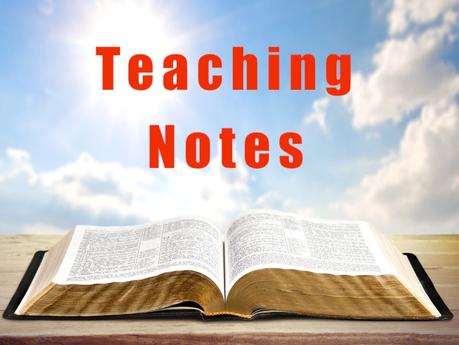Grace Thoughts
Teaching Notes: On Genesis 9

Teaching Notes are Bible studies we taught before GraceLife Ministries began publishing articles online in 1995. Some were presented as sermons, others as group studies.
Our hope is that these older studies will be a blessing to you in your life and ministry. Please use them in any way God leads you.
These teaching notes are from a series of studies about the Book of Genesis.
[These notes are from a study from almost 45 years ago.]
Genesis 9:1-3
And God blessed Noah and his sons, and said unto them, Be fruitful, and multiply, and replenish the earth. And the fear of you and the dread of you shall be upon every beast of the earth, and upon every fowl of the air, upon all that moveth upon the earth, and upon all the fishes of the sea; into your hand are they delivered. Every moving thing that liveth shall be meat for you; even as the green herb have I given you all things.
God blessed Noah and his sons. It’s beautiful to watch God forgive and go on. It is a most remarkable attribute.
Noah and his sons were to be fruitful and increase in number and fill the earth.
Up until this time, man had only eaten plants and fruits and nuts. Now he would also be allowed to eat animals, birds and sea life. The dominion of man over creatures would become more negative in its aspects.
Genesis 9:4-7
But flesh with the life thereof, which is the blood thereof, shall ye not eat. And surely your blood of your lives will I require; at the hand of every beast will I require it, and at the hand of man; at the hand of every man’s brother will I require the life of man. Whoso sheddeth man’s blood, by man shall his blood be shed: for in the image of God made he man. But flesh with the life thereof, which is the blood thereof, shall ye not eat. And surely your blood of your lives will I require; at the hand of every beast will I require it, and at the hand of man; at the hand of every man’s brother will I require the life of man. Whoso sheddeth man’s blood, by man shall his blood be shed: for in the image of God made he man. And you, be ye fruitful, and multiply; bring forth abundantly in the earth, and multiply therein.
God restricts man in eating animal flesh. Meat with lifeblood in it may not be eaten. Why? Probably as part of the education of God’s people to understand the blood sacrifice and atonement.
God also points out the the life of man is sacred. Any animal or man that sheds the blood of a man will be accountable to God. God gives the famous charge of punishment of death for murder in verse 6. Verse 7, in contrast, points man from taking life to making life — “be ye fruitful, and multiply; bring forth abundantly in the earth, and multiply therein.”
Genesis 9:8-17
And God spake unto Noah, and to his sons with him, saying, And I, behold, I establish my covenant with you, and with your seed after you; And with every living creature that is with you, of the fowl, of the cattle, and of every beast of the earth with you; from all that go out of the ark, to every beast of the earth. And I will establish my covenant with you, neither shall all flesh be cut off any more by the waters of a flood; neither shall there any more be a flood to destroy the earth. And God said, This is the token of the covenant which I make between me and you and every living creature that is with you, for perpetual generations: I do set my bow in the cloud, and it shall be for a token of a covenant between me and the earth. And it shall come to pass, when I bring a cloud over the earth, that the bow shall be seen in the cloud: And I will remember my covenant, which is between me and you and every living creature of all flesh; and the waters shall no more become a flood to destroy all flesh. And the bow shall be in the cloud; and I will look upon it, that I may remember the everlasting covenant between God and every living creature of all flesh that is upon the earth. And God spake unto Noah, and to his sons with him, saying, And I, behold, I establish my covenant with you, and with your seed after you; And with every living creature that is with you, of the fowl, of the cattle, and of every beast of the earth with you; from all that go out of the ark, to every beast of the earth. And I will establish my covenant with you, neither shall all flesh be cut off any more by the waters of a flood; neither shall there any more be a flood to destroy the earth. And God said, This is the token of the covenant which I make between me and you and every living creature that is with you, for perpetual generations: I do set my bow in the cloud, and it shall be for a token of a covenant between me and the earth. And it shall come to pass, when I bring a cloud over the earth, that the bow shall be seen in the cloud: And I will remember my covenant, which is between me and you and every living creature of all flesh; and the waters shall no more become a flood to destroy all flesh. And the bow shall be in the cloud; and I will look upon it, that I may remember the everlasting covenant between God and every living creature of all flesh that is upon the earth. And God said unto Noah, This is the token of the covenant, which I have established between me and all flesh that is upon the earth.
God has been establishing a covenant (bərîṯî) with mankind. It is not a conditional agreement between God and men. God will never destroy all life by a flood again.
God places a rainbow (qaštî) in the sky as a sign of His covenant to all mankind of all generations since the Flood. It is a sign visible to Him and man as a continuing reminder of the sin of man, judgment of God, mercy of God and promises of God. It is unconditional and God places a sign in the sky to let everyone know.
Genesis 9:18-29
And the sons of Noah, that went forth of the ark, were Shem, and Ham, and Japheth: and Ham is the father of Canaan. These are the three sons of Noah: and of them was the whole earth overspread. And Noah began to be an husbandman, and he planted a vineyard: And he drank of the wine, and was drunken; and he was uncovered within his tent. And Ham, the father of Canaan, saw the nakedness of his father, and told his two brethren without. And Shem and Japheth took a garment, and laid it upon both their shoulders, and went backward, and covered the nakedness of their father; and their faces were backward, and they saw not their father’s nakedness. And Noah awoke from his wine, and knew what his younger son had done unto him. And he said, Cursed be Canaan; a servant of servants shall he be unto his brethren. And he said, Blessed be the Lord God of Shem; and Canaan shall be his servant. God shall enlarge Japheth, and he shall dwell in the tents of Shem; and Canaan shall be his servant. And Noah lived after the flood three hundred and fifty years. And all the days of Noah were nine hundred and fifty years: and he died.
We are reintroduced to Noah’s sons. (An interesting parenthesis tells us that Ham is the father of Canaan.) From these three men and their wives would come the peoples of the earth.
Verse 20 introduces us to Noah’s trade. He was a farmer, a man of the soil (like Adam and other ancestors). One of the first things he did was to plant a vineyard and then drink wine from the harvest. He became drunk and lay naked in his tent. ham saw his father’s nakedness and told his brothers who were outside. Instead of looking, Shem and Japheth took a garment and laid it across their shoulders, turned backwards, walked into Noah’s tent and covered him without looking. When Noah woke up he found out what his youngest son had done and cursed Canaan (Ham’s son).
Why curse Canaan? What was the son of Ham? These are hard questions to answer. Some scholars believe that Canaan committed the sin of viewing his grandfather’s nakedness and that Ham, also in the tent, mocked his father’s behavior to his brothers. Other scholars have suggested homosexuality on Ham’s (or Canaan’s) part while Noah slept. Whatever was the case, Noah prophesies about Canaan, Shem and Japheth. Canaan would be the lowest of slaves to his uncles. Shem would have a special relationship to God. Japheth would have extensive territories and be blessed in some way through Shem (possibly because of how Shem and Japheth demonstrated consideration for their father’s nakedness). Canaan would also be his slave (‘eḇeḏ).
Noah lived 350 years after the Flood to the ripe old age of 950 years. Then he died. Noah apparently fathered no more children. At least none are mentioned.
This section reminds us that sin was not destroyed in the Flood. Evil and depravity are at the base of man’s nature. It arose quickly in the new world. The flesh was very much alive.
Next Time
We will look at Genesis Chapter 10 in the next part of our special series.
[Thank you for reading these teaching notes from almost 45 years ago. My prayer is they will be a blessing to you and your life and ministry.]
 CanaanFloodGenesisHamJaphethNoahShem
CanaanFloodGenesisHamJaphethNoahShem

Published by gracelifethoughts
Founder & Director of GraceLife Ministries View all posts by gracelifethoughts
